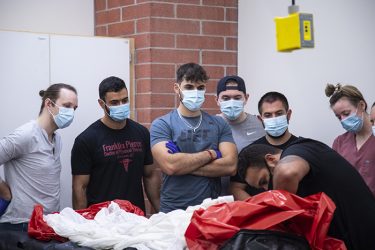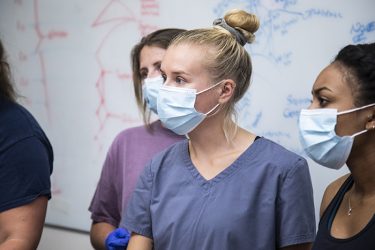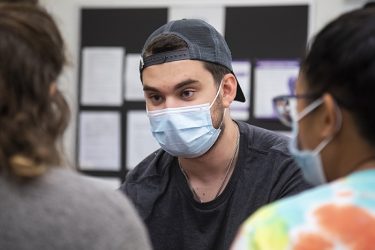
Story by Lana Sweeten-Shults
Photos by Garrett Ohrenberg
GCU News Bureau
Dr. Letha Zook, Chair of the Doctor of Physical Therapy Program at Franklin Pierce University, could almost hear it: the sound of gears turning in her students’ heads as they stared in wonder at the human brain in Grand Canyon University’s Cadaver Dissection Lab.
Nearby, a GCU Mastering Anatomy Program (MAP) student pointed out the parts of the brain to the graduate-level students, who are working toward their doctoral degrees in physical therapy.

At an adjacent anatomy station, Jacob Lahti, a recent GCU biology graduate with a pre-med emphasis — and a former MAP student — said, “You guys have talked about the plantaris, I’m sure,” as he pointed out the long, thin muscle behind the knee on one of the lab cadavers.
“How do you tell the difference between a vein and an artery?” one of the Franklin Pierce students asked.
“Veins are usually darker,” Lahti answered.
The anatomy banter played out on a recent Friday morning at GCU’s cadaver labs on the first floor of the Technology Building, where more than a dozen Franklin Pierce physical therapy school students got an up-close, hands-on anatomy lesson on the campus’ cadavers.
And they did so with the help of students in the Mastering Anatomy Program, helmed by Michael Bodeen, faculty lead in human dissection for the College of Science, Engineering and Technology.
“They have already done all their anatomy, but they have not used cadavers (at Franklin Pierce), so this is kind of a way for them to look at the cadavers and see the depth of the material,” said Zook.
“It’s kind of hard to see that in a book.”
This summer marked the first time Goodyear-based Franklin Pierce University has collaborated with GCU.
“We’re very impressed with Michael Bodeen’s MAP program,” Zook said. “The students that come out of there, they’re already ready to go, at least through our first-year process.”
The intense, multiyear initiative takes students on a deep dive into anatomy and readies them for graduate school.

One of the cornerstones of the program is its mentorship model. Once a student masters the anatomy of certain organ systems or anatomical regions, they move up to leadership roles in the lab and start teaching and mentoring fellow students who are coming up in the program.
That student-to-student mentorship model was in action for the visit from Franklin Pierce.
Lahti said of working with those students, “I love sharing that knowledge. Of course, it also helps me keep it (the material) fresh, so that’s always nice.”
Franklin Pierce’s Jennifer Torres said being in GCU’s cadaver labs was an awesome opportunity.
“We don’t get to see this (the human body) in its entirety in our classes,” she said. She often is studying, say, just the upper extremity or the lower extremity. “Seeing it as a full body really kind of brings the picture together.”
David Devine, another Franklin Pierce grad student, worked on cadavers during undergraduate school at Arizona State University.
What he loved about being in GCU’s cadaver labs: being able to see the different areas of the brain after recently learning about different types of strokes.
“It’s been interesting to see the vessels, and if clots were to occur, how the corresponding area is affected,” he said.
Zook and Bodeen see the partnership between the universities as growing into more than just hands-on, experiential learning.
It’s also a way to connect GCU’s students to graduate school.

“We have a lot of students who are trying to get into PT school. It’s a great opportunity to get to collaborate with them (at Franklin Pierce) and show them what we have – and to get the MAP and Research (and Design) Program out there,” said Jordan Davis, a GCU biology senior with a pre-physician assistant emphasis.
Added Zook, “It’s good for them (GCU’s pre-health students) to have physical therapy students around. It’s important to encourage other students to go into the field.”
Bodeen is particularly excited about the partnership. He’s hoping the collaboration might lead to even bigger projects.
“I have some research interest in dealing with facet syndrome and deep back issues,” he said. “We could potentially go into joint research projects, something that would be publishable. Maybe there’s this whole positive event of, we now have publishable papers coming out of what we do.”
Zook, a member of the American Physical Therapy Association, said she also has thought about bringing physical therapists to GCU for clinically based anatomy.
“We’re trying to figure out ways to maximize what they’re doing here at GCU with the rest of the physical therapy community,” she said.
And what they’re doing at GCU, said Lahti, has the gears turning in his head, even now — something he hopes to continue to share with students from Franklin Pierce University and beyond as he transitions from MAP student to adjunct instructor at GCU.
“I remember what it was like when I first started here and how cool I thought everything was. I love getting to be on the other side of the fence now and share that with other people, especially when they haven’t seen cadavers before.
“You’re not only getting to show them the stuff that they learned about (in their books and classrooms), but you’re also getting this reaction to something totally new and different. It’s just a lot of fun.”
GCU senior writer Lana Sweeten-Shults can be reached at [email protected] or at 603-639-7901.
***
Related content:
GCU Today: Anatomy duo muscles into distance learning
GCU Today: Anatomy group’s body of work: Creating a human atlas



































































